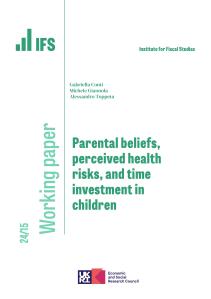<p>We evaluate the effects of undergoing any early education (before the compulsory starting age of 5) and of pre-school on a cohort of British children born in 1958. In contrast to most available studies, we are able to assess whether any effects on cognition and socialisation are long-lasting, as well as to estimate their net impact on subsequent educational attainment and labour market performance. Controlling for a particularly rich set of child, parental, family and neighbourhood characteristics, we find some positive and long-lasting effects from early education. Specifically, pre-compulsory education (preschool or school entry prior to age 5) was found to yield large improvements in cognitive tests at age 7, which, though diminished in size, remained significant throughout the schooling years, up to age 16. By contrast, attendance of pre-school (nursery or playgroup) was found to yield a positive but short-lived impact on test scores. The effects on socialisation appear to be more mixed: we found some positive, though short-lasting, effects of pre-compulsory education on teachers' reports of social adjustment (only at age 7); on the other hand, we found some adverse behavioural effects according to parental reports at age 7 which persisted up to age 11. In adulthood, pre-compulsory education was found to increase the probabilities of obtaining qualifications and of being employed at age 33. For both pre-compulsory education and pre-school per se, we found evidence of a marginally significant 30 per cent wage gain at age 33. </p>









